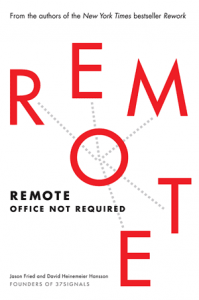The authors are founders of 37Signals. The book talks about how to go about remote work, its advantages and pitfalls.

Here are some key takeaways from the book.
- Technology has enabled remote work and its growing.
- Meetings are over-rated. And a lot of things done over in meetings can be done via chat groups, emails, or audio calls.
- Remote workers should have at least a partial overlap with rest of the team for coordination. Regular work updates keep everyone in sync.
- To avoid a single point of slow-down and failures, everything is shared and documented. No more tapping on a colleague’s shoulder.
- It is important for a remote worker to both the check-in as well as the check-out. Lack of office leads to fuzzy work-life boundaries. Having different equipment is helpful in such cases.
- Since most conversations with remote workers will be written, writing becomes a really important skill.
- To level the playing field between remote and local workers, most meetings should happen over email and chat rooms.
- Reduce dependencies - remote workers should be easily able to buy stuff than waiting for approval (up to a limit).
- Having a routine is of paramount importance to a remote worker.
- A remote worker should take the effort to regularly change the scenery. A home office can lead to boredom in the longer run. If needed, s/he should rent a shared office space.
- To avoid getting ignored, a remote worker should make noise and make progress on exceptional work.